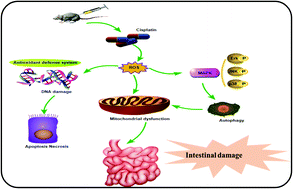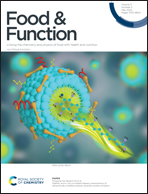Red ginseng protects against cisplatin-induced intestinal toxicity by inhibiting apoptosis and autophagy via the PI3K/AKT and MAPK signaling pathways
Abstract
Although growing evidence has shown that ginseng (Panax ginseng C.A. Meyer.) exerts strong protective and preventive effects on cisplatin-induced side effects, including nephrotoxicity, ototoxicity and cardiotoxicity, the ameliorative effects of ginseng on intestinal damage caused by cisplatin are unknown to date. Red ginseng (RG), a major processed product of the roots of Panax ginseng C.A. Meyer, can be used to control chemotherapy drug-induced multiple toxicity. In the present work, an animal model of cisplatin-induced intestinal injury was established to evaluate the ameliorative effects of RG and their underlying molecular mechanism for the first time. The results showed that a single cisplatin injection (20 mg kg−1) leads to loss of body weight, shrinkage of the small intestine, and sharp increase of the intestinal function index of diamine oxidase (DAO). These symptoms were remarkably relieved after the administration of RG at 300 and 600 mg kg−1 for 10 continuous days, respectively. In addition, RG markedly reduced the increase in malondialdehyde (MDA) levels and the consumption of superoxide dismutase (SOD) and catalase (CAT) caused by cisplatin-induced oxidative stress. Furthermore, RG pretreatment dramatically improved the cisplatin-induced apoptosis of intestinal villous cells, irregular nuclear arrangement, ablation of crypt cells, and damage to the mechanical barrier. In this study, pharmacological methods have been used to prove that RG can inhibit cisplatin intestinal toxicity by activating the PI3K/AKT signaling pathway to inhibit apoptosis and by antagonizing the MAPK-mediated autophagy pathway.



 Please wait while we load your content...
Please wait while we load your content...